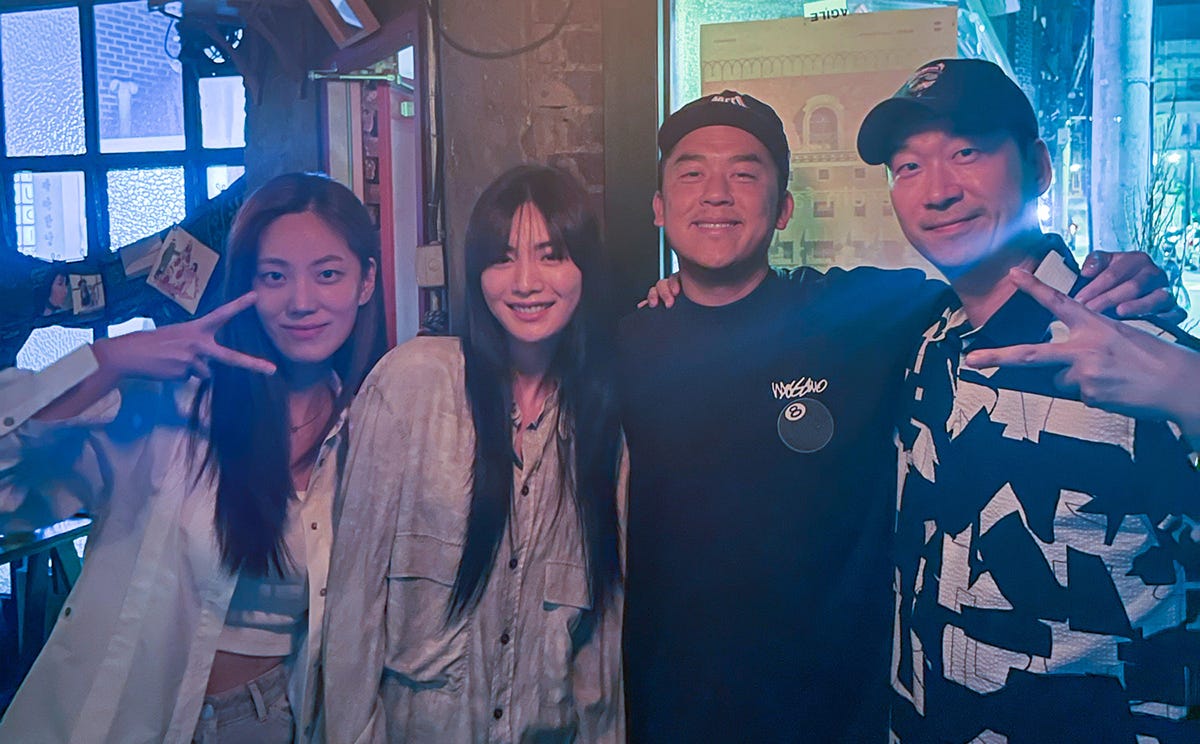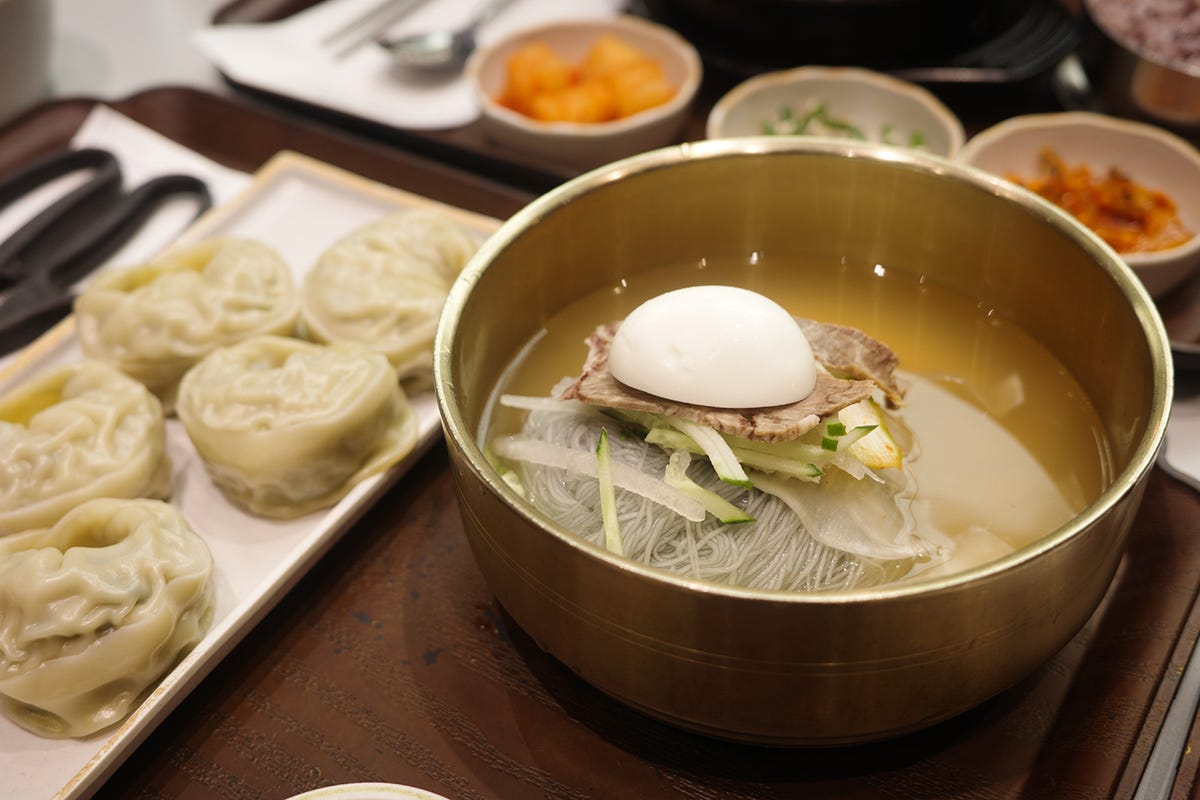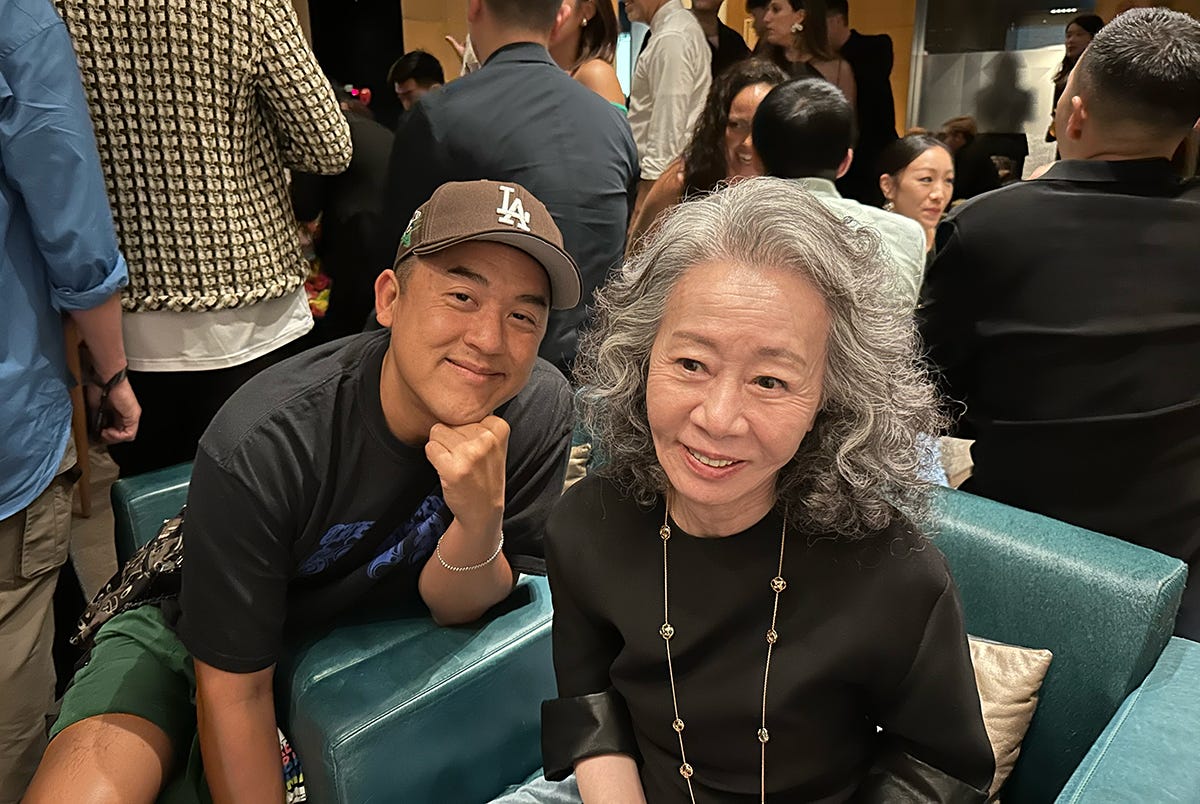The part of my Tim Ferriss podcast interview that really seemed to resonate with listeners was the Korean Wave or “hallyu.” Suddenly, seemingly, Korean culture has been exported worldwide. It’s the gochujang mayo on your fries, the Squid Game on your TV, the BLACKPINK in your area. As much as it may surprise you, it’s astonishing to a second-generation Korean-American like me, who straddled both worlds growing up, and believed it impossible that the outside world would one day celebrate and adopt our fashion, music, cinema/TV, tech, food, and beauty. And yet, we watched this happen. It took just one generation.
[The cast and director/writer of Netflix’s Mask Girl]
My brothers and I listened to Seo Taiji and Boys and DJ DOC in the privacy of our childhood bedrooms, not knowing they’d plant the seeds for H.O.T. and Gangnam Style1, which would sprout into BTS and NewJeans on the international pop charts. We were ashamed to pack stinky, fermented foods in our Hanna-Barbera lunch pails, following procedure with PB&J sandwiches instead. When I’d take my white friends to Korean BBQ, they’d pick at the marinated slices of beef with their metal forks and make a face. “What animal is this?” We both knew what they meant.
Late-night, my parents watched singing talent shows and rented soap opera videotapes from the Korean grocer in town. The Korean series were emotionally laden, heavy like a monsoon. They made U.S. dramas feel like Nickelodeon. After a long day’s work, I wondered why my parents chose to unwind by eating dried squid over K-dramas when American families ate popcorn, indulging in Friends and Ally McBeal.
I’m ashamed to admit that if I’d had the choice, I probably would have checked a different race/ethnicity box at various points in my life. As a youth, I was immersed in the punk/skate culture of my white peers but modeled the aesthetic language of the Latinos and Chicanos at my school. I’m Asian-American, but identified more with the Japanese because of anime, fashion, and their adoption of street culture in the 1990s. Even when we started the brand in the 2000s, I was inspired by Hong Kong artists, lifestyle, and attitudes (much of which can be found in the early The Hundreds).
My Koreanness was always a steady hum in the background, yet in my young life, those notes rarely broke through. I didn’t suppress it, but I didn’t cultivate it, finding scant inroads to this identity through peers or subculture. Due to my strained relationship with my parents and because there were so few Korean-Americans around me, my heritage was like a distant cousin that I was somehow bound to, but felt no warmth or affection for. It felt more contractual than anything.
I barely spoke the language and had little access to the food outside of my mom’s cooking. Even then, she did her best to assimilate us into American fare. We ate Kentucky Fried Chicken and pork chops from Costco for dinner. Our native food was something my parents ate alone when their stomachs just couldn’t absorb America’s fried foods and rich dairy anymore. My dad brushed his teeth thoroughly before returning to the office. He had sacrificed everything to be here, and he’d be damned if a tangy kimchi leaf would betray him. There could be no trace of his being a foreigner.
Many – if not most – Korean-Americans of my generation bond over similar experiences. It was hard enough being Asian in America in the ‘70s, ‘80s, and ‘90s, but we then had to explain where Korea was on a map to everyone who asked, “So, are you Chinese or Japanese?” If they had heard of Korea, they thought of the communist North with its zany dictator and nuclear missiles. They not only looked at you as an alien, but the enemy (even though we were allies).
Korean-Americans sought comfort in community (church, elite Orange County schools), but if you were like me and didn’t have much of a sanctuary from the Bruce Lee howls and Mr. Miyagi crane kicks, then you may have also harbored some weird feelings about being Korean. Many books and TV shows (Minor Feelings, Minari, Crying in H Mart, Beef) have been born of this class and conflict.
Today, my children are proud to carry Korean blood, are curious about their history, and find themselves well-represented not just in Asia, but America. When I share these anecdotes with them, they find them curious and bizarre. They understand that they are still a minority of a minority here in the States, but their non-Korean classmates sing Korean lyrics and their favorite YouTubers resemble them. Over the pandemic, my kids asked if they could sign up for Korean lessons, which was a form of punishment for my generation. For them, it is central to their identity and amplified their super power. Because, they’re right, being Korean is a gift and a positive differentiator. And largely because of them, I’ve also developed a new and romantic relationship with my Koreanness.
I just returned from a week in Seoul. I’m now consciously making the effort to return as frequently as I can to Korea, whether for business or personal exploration. I’ve dedicated the remainder of my life to relearning everything I believed about my background and people. At my age, it’s rare that I discover a new obsession, one that I lose sleep over, one that haunts me when I’m awake. But Korea is in my bones, it’s in my bloodline, it’s in my origins story.
I always thought it crazy that for thousands of years, my people lived and died in one localized region of the world. And then in the 1970s, my parents flew across the Pacific Ocean and planted us in Southern California, speaking a different tongue, exposing us to an opposite diet, leaving us to find ourselves amongst an ocean of disparate faces. Through sheer gravity, eons of ancestors and annals of family history are pulling me back home like a rip current dragging me out to sea. I feel the tug and the weight daily now. It is harder to make sense of myself on this side of the border. How odd. I am disoriented, swept up in the Korean Wave.
Just for my paid subscribers, here’s a compilation of some of my favorite Korean music videos from my life! Some are niche, some were milestones for the Korean recording industry. All are part of the hallyu mosaic.







